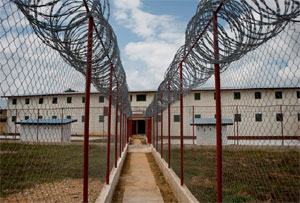In August 2010, jhr-trained Liberian journalist Peter Massaquoi embarked on a reporting trip to Zwedru Correction Palace in Liberia’s Grand Gedeh County. Massaquoi had attended numerous human rights reporting workshops with jhr and wanted to investigate the human rights issues affecting the lives of inmates, including long-term detention without trial.
Massaquoi spoke with the prison’s superintendent and discovered that the prison was devoid of electricity and consequently in complete darkness. The Ministry of Justice had failed to provide fuel for generators for almost five months – forcing authorities to use candles for night patrols. Inmates admitted to sleeping in darkness for long periods of time and to not benefitting from rehabilitation programs. After the story “Correction Palace in Darkness” aired on Truth Radio, one of Liberia’s most popular stations, the response was immediate. The Ministry of Justice called a news conference and threatened the prision superintendent with dismissal. However, Massaquoi and his news team provided clear evidence to support his story, prompting the Ministry to issue an apology. The Ministry subsequently provided a monthly allocation of 125 gallons of fuel to the prison – and the lights went back on.



